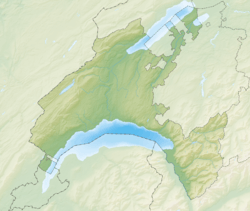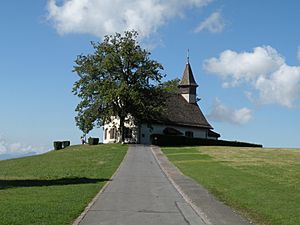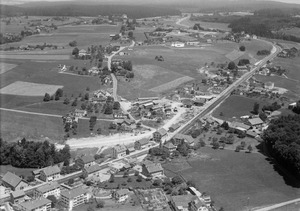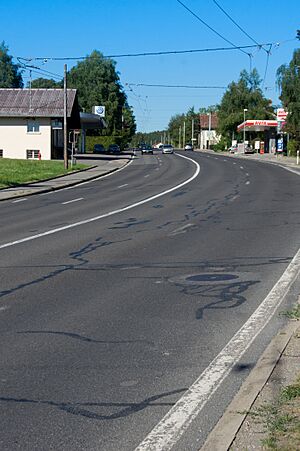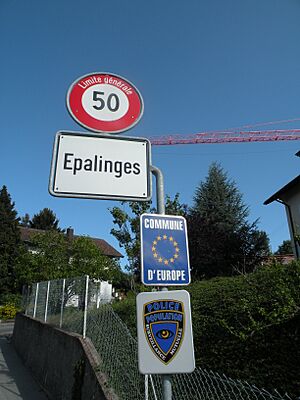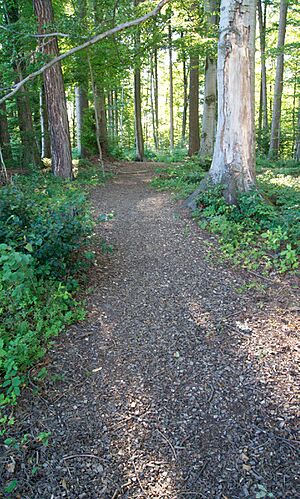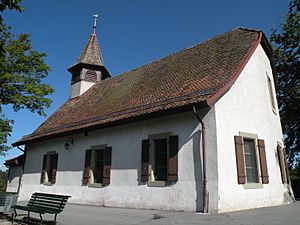Épalinges facts for kids
Quick facts for kids
Épalinges
|
||
|---|---|---|
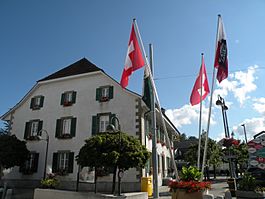
Epalinges town hall
|
||
|
||
| Country | Switzerland | |
| Canton | Vaud | |
| District | Lausanne | |
| Area | ||
| • Total | 4.57 km2 (1.76 sq mi) | |
| Elevation | 785 m (2,575 ft) | |
| Population
(Dec 2020 )
|
||
| • Total | 9,769 | |
| • Density | 2,137.6/km2 (5,536/sq mi) | |
| Postal code |
1066
|
|
| Surrounded by | Le Mont-sur-Lausanne, Lausanne | |
Épalinges is a lovely municipality in the Vaud canton of Switzerland. It's a suburb, which means it's a town right next to a bigger city, in this case, Lausanne. People from Épalinges are sometimes called Palinsards.
Contents
- History of Épalinges
- Geography and Nature in Épalinges
- What is the Épalinges Coat of Arms?
- Who Lives in Épalinges? (Demographics)
- Politics and Government in Épalinges
- Economy and Jobs in Épalinges
- Religion in Épalinges
- Education in Épalinges
- Sports and Recreation
- Famous People from Épalinges
- See also
History of Épalinges
Épalinges has a long history! It was first mentioned way back in 1182. Back then, it was known by a slightly different name: de Spanengis.
Geography and Nature in Épalinges
Épalinges covers an area of about 4.57 square kilometers (about 1.76 square miles). A good part of this land is green and natural. About 18.8% of the area is used for farming. This means there are fields where crops grow and pastures for animals.
Forests cover about 25.6% of Épalinges. These are important green spaces! The rest of the land, about 56.7%, is where buildings and roads are located. This includes homes, schools, and places where people work.
Épalinges is surrounded by the city of Lausanne. It includes a few different areas like Épalinges-Village, Les Croisettes, La Croix-Blanche, and some smaller communities called hamlets.
What is the Épalinges Coat of Arms?
A coat of arms is like a special symbol or emblem for a town or family. The coat of arms for Épalinges has a unique design. It's split into two main colors: silver (or white) on top and red on the bottom. In the middle, there's a black gander (a male goose) with silver outlines and a red beak.
Who Lives in Épalinges? (Demographics)
Épalinges has a population of around 8,000 people. Many people who live here were born in Switzerland, but a good number of residents come from other countries. This mix of people makes the community diverse and interesting!
Most people in Épalinges speak French, which is the main language in this part of Switzerland. However, you'll also hear German and English, along with other languages like Italian.
The population of Épalinges has been growing steadily over the years. This means more people are choosing to live here, which can bring new ideas and energy to the town.
How Has the Population Changed Over Time?
The chart below shows how the number of people living in Épalinges has changed throughout history. You can see how the population has grown from just a few hundred people centuries ago to thousands today.

Politics and Government in Épalinges
In Switzerland, people vote for their leaders and parties in elections. In the 2007 federal election, the SP was the most popular party in Épalinges. They received the most votes from the citizens. Other popular parties included the SVP, the Green Party, and the FDP.
Economy and Jobs in Épalinges
Épalinges is home to some important organizations. One is the Swiss Institute for Experimental Cancer Research (ISREC). This foundation works to find new ways to fight cancer. Another is the Health Sciences eTraining Foundation (HSeT), which helps people learn about health sciences online.
Many people in Épalinges have jobs in different areas. Some work in agriculture, like farming. Others work in manufacturing or construction, building things. A large number of people work in the "tertiary sector." This includes jobs in:
- Sales and retail
- Transportation
- Hotels and restaurants
- Information technology
- Finance
- Science and technology
- Education
- Healthcare
Many residents of Épalinges travel to other towns for work, especially to nearby Lausanne. Similarly, some people from outside Épalinges come to work in the municipality.
Religion in Épalinges
Épalinges is a place where people of different faiths live together. Many residents are Roman Catholic or belong to the Swiss Reformed Church. There are also people who follow other Christian faiths, as well as Islam and Judaism. Some residents are also Buddhist or Hindu. A number of people in Épalinges do not belong to any church.
Education in Épalinges
Education is very important in Épalinges. Many adults have completed high school and gone on to higher education, like university.
The local school system provides education for children of all ages. This includes:
- Pre-school for young children
- Primary school for the first four years of schooling
- Lower secondary school for six years after primary school
Some students in Épalinges also choose to be home-schooled or attend other types of schools. While many students attend schools within Épalinges, some travel to other municipalities for their education.
Sports and Recreation
Épalinges is a great place for sports! The European Golf Association (EGA) has its main office here. The Golf Club de Lausanne is also partly located in the municipality. This golf course has hosted many important golf tournaments over the years.
Famous People from Épalinges
Several well-known people have lived in Épalinges, including:
- Thomas "Loel" Guinness and Gloria Guinness
- Dolores Guinness
- Loel Patrick Guinness
- Jean Marie Pierre Hubert Taittinger
- Georges Simenon, a famous writer
- Ingvar Kamprad, who founded IKEA
- Derek Quinlan
- Raymond Burki, a well-known cartoonist
See also
 In Spanish: Epalinges para niños
In Spanish: Epalinges para niños
 | Jewel Prestage |
 | Ella Baker |
 | Fannie Lou Hamer |




